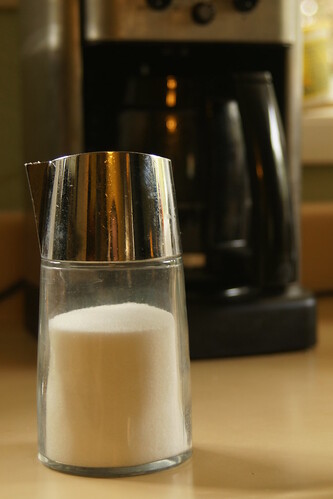|
Although the term sugar addiction sounds a bit harsh, studies are being made to settle the question once and for all: is the overeating of sugary food a habit or an addiction? The problems associated with a high sugar intake range from obesity, tooth decay, diabetes, heart disease and some others. Even though sugar isn't nearly as scary as alcohol or drugs, most of us are used to eat large amounts of it. The worst part is that we are unaware of our high consumption of this sweet substance!

But does eating sugar everyday qualify as an addiction? Maybe or maybe not, but I must confess that I AM adicted to sugar. There, I said it. How do I know? Well, I've tried (unsuccessfully) to remove sugar from my diet and the abstinence symptoms were very present. I was irritable, moody, had headaches and, the most important of symptoms, I started noticing sugar was EVERYWHERE. I missed the sugar in my morning coffee, in the dessert after lunch and in my afternoon snack. And I hadn't really supressed complex sugars found in carbs, like pasta or bread.

Image by bossacafez
Apparently, sugar addiction has physiological and psicological components. Sugar, as other addictive substances, releases opioids and dopamine, so the addictive potential is expected. Also, in western societies, sugar has been associated with comfort, possitive rewards and happy events celebration (birthday cake anyone?). Experiments have been performed on rats to demonstrate the effect of addiction and withdrawal and the results have been similar to other addictive substances.
What does this mean? In my humble opinion, we should start looking at ourselves, our diets and habits, in the most objective manner, and determine if we are addicted to sugar or not. I've already taken my first step: I've admitted I have a problem!



 Original Articles. Constant-Content.
Original Articles. Constant-Content.
Sweet! (no pun intended)
I like your style, and your scientific background for your stories are great too. Of course, being a scientist yourself helps, doesn't it?
But don't assume you are addicted just yet. If your abstinence symptoms are your clues, then my baldness qualify as addiction as well (I see it everywhere!). You may only be experiencing the psychological effects of withdrawal. Like a kid whose favorite toy is removed (he would likely have all the symptoms you described), but he is not addicted.
In the end, you are right, we need to look at ourselves and what we do to our bodies. Healthy habits (and any habit for that matter) require discipline, commitment and consistency. Set a goal and stick to it, you may not win them all, but you would definitively not lose them all.
This was a great reading. ***** Five Stars for you!
Thank you very much!
Your are hilarious! Do you have a blog yourself?
Thanks for reading! =)